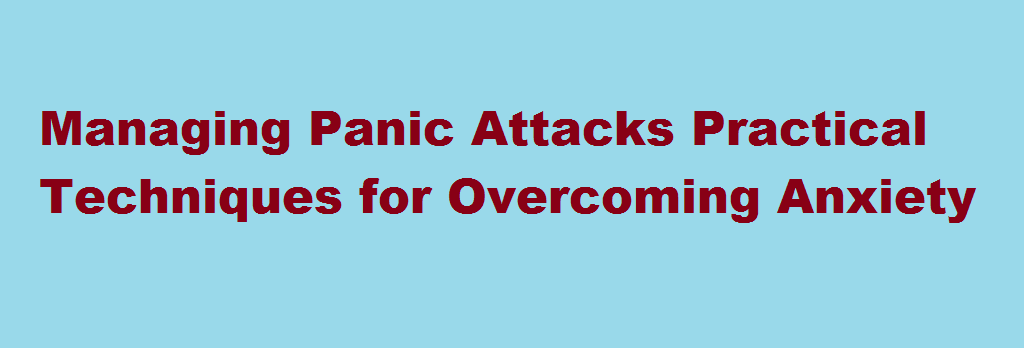Managing Panic Attacks Practical Techniques for Overcoming Anxiety
4 min read
Introduction
Panic attacks can be overwhelming and debilitating, leaving individuals feeling helpless and fearful. However, with the right strategies, it is possible to regain control and minimise the impact of panic attacks. In this article, we will explore practical techniques that can help individuals effectively handle panic attacks. By understanding the triggers, learning relaxation techniques, and seeking professional help when needed, one can navigate through panic attacks and lead a more fulfilling life.
Understanding Panic Attacks
Before delving into managing panic attacks, it’s crucial to grasp what they entail. Panic attacks are intense episodes of anxiety characterised by a rapid onset of overwhelming fear or distress. They may be accompanied by physical symptoms such as rapid heartbeat, shortness of breath, chest tightness, sweating, and dizziness. Panic attacks can occur unexpectedly or in response to specific triggers, such as crowded spaces or public speaking. Recognizing these triggers is the first step in managing panic attacks effectively.
Breathing and Relaxation Techniques
Controlling breathing patterns during a panic attack can help regulate the body’s response and reduce symptoms. Deep breathing exercises, such as diaphragmatic breathing, can be practised to calm the body and mind. Breathing slowly and deeply while counting to four during inhalation and exhalation to the count of four can promote relaxation.
Progressive muscle relaxation is another effective technique. By systematically tensing and then relaxing different muscle groups, individuals can alleviate tension and promote a sense of calm. Visualisation exercises, guided imagery, and mindfulness meditation can also contribute to reducing anxiety levels during panic attacks.
Cognitive-Behavioural Strategies
Cognitive-behavioural therapy (CBT) techniques can significantly assist individuals in managing panic attacks. One such technique is cognitive restructuring, which involves challenging and replacing negative thoughts with more rational and positive ones. By reframing catastrophic thinking patterns, individuals can reduce the intensity of panic attacks.
Another essential aspect of CBT is exposure therapy. Gradually exposing oneself to feared situations or triggers can help desensitise the anxiety response. Through repeated exposure, individuals can learn that their fears are unfounded and that panic attacks are manageable.
Lifestyle Modifications
Engaging in regular exercise, adopting a balanced diet, and maintaining a healthy sleep routine are essential for managing anxiety and panic attacks. Physical activity releases endorphins, which elevate mood and reduce stress levels. A well-balanced diet rich in fruits, vegetables, whole grains, and lean proteins supports overall mental well-being.
Additionally, practising stress management techniques, such as mindfulness and relaxation exercises, can provide long-term benefits. Limiting the consumption of caffeine, alcohol, and nicotine is also crucial, as these substances can exacerbate anxiety symptoms.
Seeking Professional Help
While self-help strategies can be effective, it is important to acknowledge when professional help is necessary. Mental health professionals, such as therapists or psychiatrists, can provide guidance, support, and evidence-based treatments for managing panic attacks. They may recommend therapies such as CBT or prescribe medication to alleviate symptoms.
FREQUENTLY ASKED QUESTIONS
What Triggers Panic Attacks?
Some experts believe that exposure to overwhelming stress, low self-esteem, and certain phobias can put a person at risk for panic attacks. Others have noted that certain drugs or medications can increase the likelihood that someone will have a panic attack.
Can a Panic Attack Cause a Heart Attack?
Panic attacks can feel like heart attacks, so people who have them may wonder, can a panic attack cause a heart attack? Thankfully, the likelihood that a panic attack can trigger a heart attack is minimal.
How Can I Treat a Panic Attack?
You can’t treat a panic attack on your own – but you can consult with a professional who knows how to treat a panic attack. Talk to your family doctor, your therapist, or another qualified professional. If you’re not currently seeing a doctor or a therapist, you can contact a treatment centre like Montare Behavioral Health. We will be happy to answer any questions you have about treating panic attacks.
Conclusion
Managing panic attacks is possible through a combination of understanding triggers, practising relaxation techniques, employing cognitive-behavioural strategies, making lifestyle modifications, and seeking professional help when needed. By implementing these approaches, individuals can regain control over their lives and minimise the impact of panic attacks.
Read Also : Conquering Exam Fear Effective Strategies for Success






